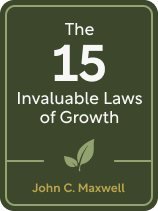

This article is an excerpt from the Shortform book guide to "The 15 Invaluable Laws of Growth" by John C. Maxwell. Shortform has the world's best summaries and analyses of books you should be reading.
Like this article? Sign up for a free trial here.
What does it mean to have good character? What difference does character make when it comes to success or failure?
According to John C. Maxwell, everyone should prioritize building character over all other goals. That’s because it’s an essential part of personal growth. On the road to true success in life, there are no substitutes for—or shortcuts around—character-building.
Continue reading to learn about the importance of character-building when it comes to reaching your potential.
The Importance of Character Building
Maxwell claims that the foundation of personal growth is good, strong character. By his definition, having “good, strong character” means that you embody three universally-valued traits: honesty, integrity, and generosity. Additionally, you consistently act in accordance with these values, even when it’s inconvenient or challenging.
(Shortform note: Maxwell suggests three “universally-valued” traits that comprise good character, but according to moral relativists, there is no universal moral code—rather, the importance of different values is culturally determined, For example, some cultures consider obedience and devotion to your parents to be an essential component of good character. Even if your essential values are different from Maxwell’s, you can still prioritize building your character by living out the values important to you.)
Maxwell emphasizes the importance of character-building not only because it ensures that you achieve your potential—the ultimate goal of personal growth—but also because it maximizes your potential. Let’s explore how strong character contributes to each of these outcomes.
Strong Character Ensures That You Achieve Your Potential
As you pursue goals in different parts of your life, you’ll find yourself in some novel situations—you’ll meet new people, take on new challenges, and try new things. According to Maxwell, having good, strong character will ensure your success in these situations because demonstrating honesty will make people respect you, acting with integrity will show people that you hold yourself to a high standard of behavior, and showing generosity by treating people well will make people want to collaborate with you.
If you consistently act in accordance with these values, people will find you more dependable and trustworthy, which will help you connect with people in your life who can help you achieve your goals.
On the other hand, if you have bad or weak character, Maxwell says, you’ll be more susceptible to failure because you’ll disregard your values when making decisions. If you see an easy way out of a dilemma, you’ll take it, even if it’s unethical. This might benefit you in the short term, but in the long run, it can set you back. For example, if you own a business, cutting corners might help you turn profits, but it could also ruin your reputation.
| Strong Relationships Allow You to Flourish Research supports Maxwell’s claim that having good character can help you make and keep valuable connections with others. Psychologists have demonstrated that having good character helps win people over in all stages of life. In childhood, we’re more open to befriending people who display positive character traits like fairness and humor. We’re also more likely to have satisfying, sustainable friendships with people who are honest and kind. This holds true in the workplace, too—when coworkers practice honesty, kindness, and other key values with each other, it leads to a healthier work environment, which promotes collaboration, employee performance, and job satisfaction. Research also supports Maxwell’s idea that healthy relationships are important if you want to succeed. While Maxwell focuses on how relationships can help you achieve various goals, maintaining fulfilling relationships may be a worthwhile goal in and of itself: According to an 80-year study by researchers at Harvard University, healthy, meaningful relationships with friends, family, and members of your community help you flourish in life because relationships are more emotionally enriching than wealth or career success. Demonstrating strong character may also help you flourish financially: Research suggests that ethical companies outshine their competitors, and unethical business dealings can incur heavy financial consequences. However, it’s important to prioritize your relational success—and your character, since that determines the quality of your relationships—over financial success. Psychologists say that if you prioritize your finances, you may be more motivated to act immorally in order to keep or build your wealth. |
Character Building Maximizes Your Potential
Since character determines what you’re capable of achieving, prioritizing the strength of your character can empower you to reach new heights. If you improve your character, and therefore your moral integrity, Maxwell says you’ll get better at intentionally living out your values with relative ease. In turn, you’ll be able to make steadier progress toward your goals.
(Shortform note: In a sense, Maxwell’s character-building is a lot like developing a healthy habit: Routinely practicing a value like honesty will eventually make it feel like second nature to you rather than a conscious decision. As such, you can practice character-building the same way you’d develop a habit, by linking your desired behavior with both a cue that tells your brain it’s time to perform the behavior and a reward after you’ve performed it. For example, if you want to become more honest, you might make a conscious effort to give your honest opinion whenever someone asks you for it (the cue) and then take time to congratulate yourself for your honesty (the reward). Over time, you’ll develop a habit of honesty.)
According to Maxwell, If you develop excellent character, you might be able to make powerful, positive changes in the world and act as living proof of the benefits of personal growth—and since having excellent character means being very generous, you’ll feel compelled to help others grow, too. Maxwell believes that demonstrating excellent character makes the world a better place, one of the primary benefits of personal growth.
(Shortform note: Making a difference in the lives of other people is important to Maxwell, but why should it be important to you? Psychologists suggest that altruistic behavior has several benefits, including decreased stress and what’s known as “the helper’s high”—the positive feelings you might have after you show someone kindness. Additionally, helping others may prompt an increased sense of purpose, which is linked to improved life satisfaction and better lifelong health outcomes.)

———End of Preview———
Like what you just read? Read the rest of the world's best book summary and analysis of John C. Maxwell's "The 15 Invaluable Laws of Growth" at Shortform.
Here's what you'll find in our full The 15 Invaluable Laws of Growth summary:
- Why personal growth is essential to living a meaningful life
- How to build strong character and live with integrity
- How to envision, commit to, and pursue meaningful goals







Your description of character was excellent.